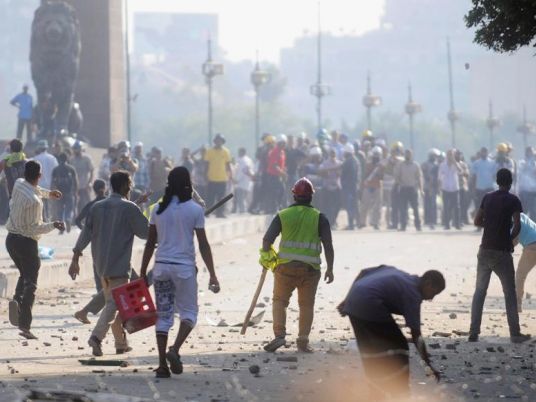
Calls for demonstrations on 11/11 do not deserve attention, MP Abdel Moneim Imam, head of the Justice Party in Egypt.
He also said in a statement that this call does not represent the Egyptian people, nor does it represent any of the political or partisan movements.
A state of anxiety prevailed in Egypt due to calls for protests on November 11, led by the Egyptian businessman Mohamed Ali.
Imam added, “The Justice Party believes that these are just suspicious individual calls launched by the remnants of the terrorist group, which the people confronted and uprooted, but some of its tails managed to escape abroad, and it is now trying hard to spread its poison inside, but will never succeed.”
“Egypt has fulfilled several constitutional requirements, and we now have a national dialogue that includes all political and partisan powers, to find real and applicable solutions on all political, economic and social dimensions,” he added.
“All national powers, whether supporters and opponents, stand behind the dialogue to chart the right path for a modern civil democratic state,” Imam continued.
Journalist and TV host Ahmed Moussa presented an audio recording attributed to fugitive Muslim Brotherhood member Taher al-Sharqawy, in which he incites to attack police stations and military facilities on November 11, and also presented another recording, in which Sharqawy expressed support for the Muslim Brotherhood’s scheme to form “revolutionary guards” in Egypt.
Moussa presented another audio leak, during his “On My Responsibility” program broadcast on Sada al-Balad channel, attributed to fugitives Mahmoud Wahba and Alaa al-Dhahiry. The two talked in the audio about chaos and sabotage schemes in the Egypt on November 11.
“Fortunately, the government will be busy with the preparations for the climate change conference. So if you manage to succeed, all the leaders of the group will come out to help, and they will have an important role in controlling the country,” Wahba said in the audio leak.
On the other hand, journalist Ibrahim Issa said that allowing the Muslim Brotherhood to “return from its winter hibernation is tantamount to the snake coming out from its hole”, stressing that “the political Islam movement is outside the national [political] framework.”
Issa added in a commentary during the “Cairo Talk” program, presented on the al-Qahera wal Nas channel, on Wednesday evening, that all the Muslim Brotherhood’s attempts to call for demonstrations on November 11 are frustrating calls and failed since the beginning.
“The November 11 call is a failure and was aborted from the first moment.
It only makes noise on the Internet. Nothing will happen on November 11, nor five people will demonstrate, and Egypt will not witness any kind of protests,” he said.
“The Brotherhood is a subversive movement and a group that is detached from reality and society, and enjoys stupidity, idiocy, dissociation from reality and denial of the truth. They are now betting on a state of frustration in the street due to the economic crisis” Issa said.
The Central Bank of Egypt (CBE) issued a statement, on Thursday morning, announcing reform measures to ensure macroeconomic stability and achieve sustainable and comprehensive economic growth, floating the Egyptian pound.
Egypt first devalued its currency by 48 percent in 2016, allowing it to float freely in order to meet a key demand by the International Monetary Fund to secure a three-year US$12 billion loan.
The CBE announced the devaluation of the Egyptian pound for the second time in March by nearly 17 percent.
The Central Agency for Public Mobilization and Statistics (CAPMAS) data showed in October that the annual consumer price inflation in Egyptian cities recorded its highest level in nearly four years
The annual consumer price inflation increased to 15 percent in September, compared to 14.6 percent in August, the agency announced in a statement.
This is the highest annual rate of consumer price inflation in Egyptian cities since November 2018, when it recorded 15.7 percent.
Fitch Solutions, a research company of Fitch Ratings Agency, expects a slowdown in the growth of economic activity in Egypt during the next 12 months, as a result of the repercussions of the Russian-Ukrainian war.
It explained that this will be reflected in the decline in economic growth estimates to 4.3 percent in the current fiscal year, compared to 6.2 percent in 2021/22.
The head of the International Monetary Fund (IMF) mission to Egypt announced in a press conference, on October 27, held with Egypt’s Prime Minister Mostafa Madbouly, the governor of the Central Bank of Egypt and a number of ministerial officers that they came up with an agreement has been concluded with Egypt on a loan worth US$3 billion over a period of six months.
Egypt has obtained loans from the IMF, amounting to about $20 billion since 2016, as part of the implementation of the economic and social reform program.
It also obtained quick financing to face the repercussions of coronavirus pandemic, and has already started paying the first loan installments.
In an earlier statement, Hisham Badawy, an economist, stressed that the IMF loan will not radically solve the economic crisis in Egypt, adding that rationalizing consumption is not a solution to confronting the high prices.
The solution ultimately lies in the search for additional income and the search for additional resources.
Badawy added, in an interview on the “Cairo Talk” program, with journalist Ibrahim Issa, on Al-Qahirah Wal-Nas channel in October that the Egyptian government must go for intensive production to get out of its economic crisis, pointing out that Egypt will be at the gate of an economic storm if the crisis continues.




